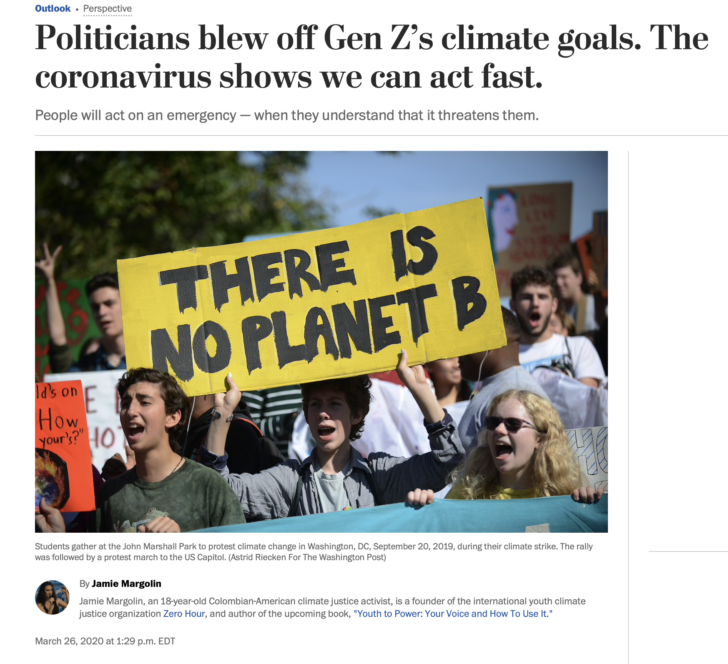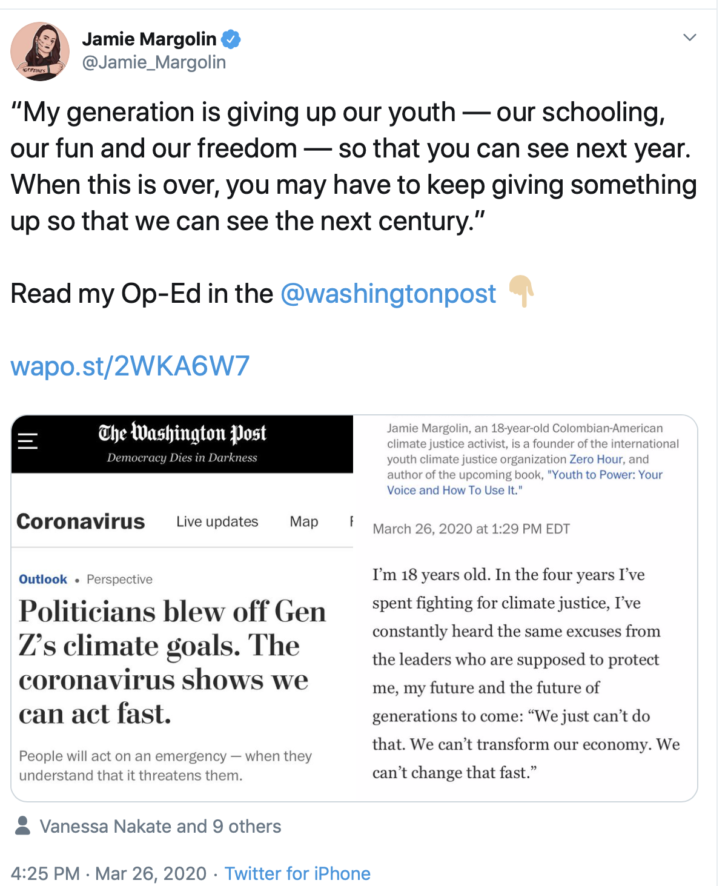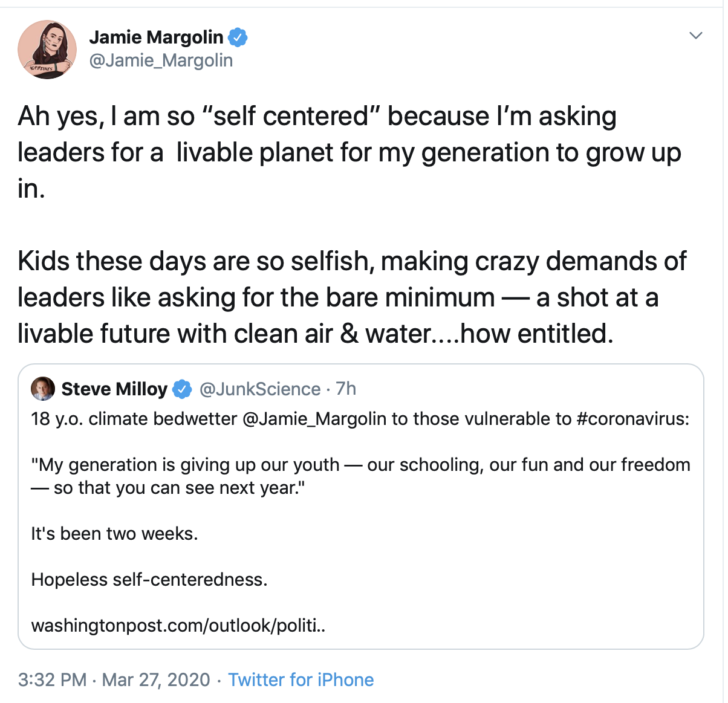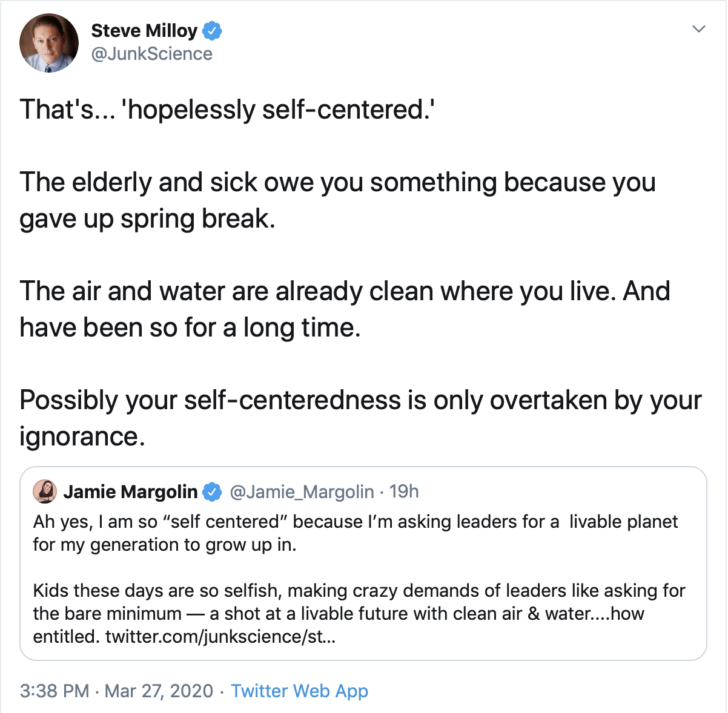Now we’re supposed to go communist because teens have been momentarily inconvenienced.

Teen climate activist Jamie Margolin penned a really asinine commentary in the WaPo yesterday. Here’s the money line:

She was so proud of it, she tweeted it:

After I called her on it, she doubled down.

To which I closed out the exchange with:

The only thing more shocking that Margolin’s idiocy is that the WaPo published it.
I skipped spring break so you can live. Now you owe me.
Just wow.
Margolin’s entire commentary is below.
###
I’m 18 years old. In the four years I’ve spent fighting for climate justice, I’ve constantly heard the same excuses from the leaders who are supposed to protect me, my future and the future of generations to come: “We just can’t do that. We can’t transform our economy. We can’t change that fast.”
House Speaker Nancy Pelosi mocks the Green New Deal as the “green dream or whatever.” President Trump dismisses the idea that the United States should ditch fossil fuels: “I’m not going to lose that wealth. I’m not going to lose it on dreams, on windmills, which frankly aren’t working too well.” Democratic presidential candidate Joe Biden, who unrolled a “middle ground” climate plan last May, instructs critics who want more drastic action, like a refusal to replace old natural gas pipelines, to “go vote for someone else.” When I testified in Congress last fall, Rep. Garret Graves (R-La.) told me that the United States shouldn’t take urgent action because other countries aren’t doing their share to reduce emissions. These climate proposals simply aren’t realistic, I keep hearing.
Well, the coronavirus pandemic has blown their cover. It has exposed how government leaders, and the American public, actually can make immediate, dramatic behavioral changes — even when those changes have serious consequences for the economy and our quality of life. It’s just that, until now, they haven’t been willing to.
Don’t get me wrong: I am strictly following public health guidelines. I am staying indoors and self-isolating. I canceled all the events and travel that I had planned for the next few months. I am doing all my schoolwork, socializing and activism online. I gave up my freedom of movement and my ability to fully pursue my passions, and I did this immediately and gladly, because I will make sacrifices to keep us all healthy. I’m encouraging all my friends and peers to do the same. I do not want to catch the disease or transmit it to older and more vulnerable people.
But the way the coronavirus disproportionately affects older people is the exact way the climate crisis disproportionately affects young people. According to a recent report from the Centers for Disease Control and Prevention, the coronavirus fatality rate is as high as 11 percent among people between the ages of 65 and 84, but 0.1 percent for those between the ages of 20 and 44. In China, more than 80 percent of deaths occurred in adults older than 60; in Italy, that proportion is more than 96 percent. While those in my generation are indeed at risk of getting the virus, and no age group is safe from covid-19, older generations have the highest risk of dying from it.
When it comes to the climate crisis, most of the statistics are flipped: Young people will suffer the most. A United Nations study estimates that countries have roughly 10 years to take “unprecedented” actions to cut carbon emissions, before it’s too late. In a decade or two, many of today’s most influential politicians won’t even be around. But my generation will be. And we will be suffering and dying in massive numbers from the countless harms of the climate crisis: air pollution permanently damaging our lungs and immune systems; more pandemics of infectious diseases; severe and frequent natural disasters, droughts and famine; a projected 150 million people displaced by sea level rise.
Sign up for our Coronavirus Updates newsletter to track the outbreak. All stories linked in the newsletter are free to access.
Why haven’t we stopped climate change? We’re not wired to empathize with our descendants.
You want young people to sacrifice — to stop socializing, to shut ourselves inside — so older people can live. But many older people aren’t sacrificing so the youth can live.
Our leaders say shutting down extractive fossil fuel industries would be too disruptive. They say factory farming and animal agriculture are here to stay, and there’s nothing anyone can do about it. They say it’s too expensive to build mass transit. They say it’s simply impossible to get to net zero emissions by 2030. They say rapidly transitioning to a renewable-energy economy is too inconvenient, too expensive.
It’s true: Those things are hard. But the coronavirus has proved that they are not impossible — that people will act in an emergency when they understand that it threatens them. Under normal circumstances, the climate catastrophe seems remote, or at least remote enough. Corporations think in terms of next quarter’s results, and politicians worry about the next election, which is at most six years away. There is no incentive to take inconvenient action, so the powerful claim they “can’t.”
This pandemic shows that they simply won’t. We’ve seen schools and businesses and churches closed, and sports and entertainment events canceled. The social and economic consequences of this emergency response have been dire, including mass layoffs and losses in profit. Our leaders have demonstrated a sudden, passionate willingness to make corporations completely modify the way they operate and to shame people into changing their habits. All of this contradicts the usual excuses for climate inaction.
This pandemic has brought business as usual to an official halt. When the worst of the illness has passed, instead of rushing to return to “normal” — the old, comfortable pattern of destroying the planet — we can take this opportunity to restructure our economy and society in a way that will ensure today’s children can live.
My generation is giving up our youth — our schooling, our fun and our freedom — so that you can see next year. When this is over, you may have to keep giving something up so that we can see the next century.